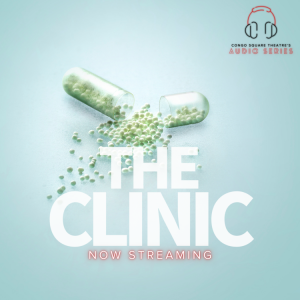
 Recommended *** Congo Square Theatre’s “The Clinic” is a rather complex audio-only tale designed to mimic an old-fashioned radio drama. It consists of six episodes of approximately twelve minutes each that largely revolve around the relationship of two doctors Dr. Latisha Bradley and Dr. Levi Carter (a/k/a L.C.). Both are romantically involved with each other at a South Side Chicago medical clinic serving the African American community. Dr. Bradley, who owns the clinic, has also been running clinical trials for a brand new medication, which is designed to cure a special type of mental illness.
Recommended *** Congo Square Theatre’s “The Clinic” is a rather complex audio-only tale designed to mimic an old-fashioned radio drama. It consists of six episodes of approximately twelve minutes each that largely revolve around the relationship of two doctors Dr. Latisha Bradley and Dr. Levi Carter (a/k/a L.C.). Both are romantically involved with each other at a South Side Chicago medical clinic serving the African American community. Dr. Bradley, who owns the clinic, has also been running clinical trials for a brand new medication, which is designed to cure a special type of mental illness.
For the most part, this tightly interwoven 75-minute broadcast starts out well, because it is filled with intrigue. The doctors at the clinic work with other characters; and, in the course of the performance, we learn about the merging of everybody’s private life with their professional life. “Data dumps” don’t normally happen on live stage, but in this audio performance, it was perfectly fine to hear each character reveal their deep thoughts and motivations. Hence, the listening audience is able to use our collective imagination to conjure up all the action.
What I liked most about the show, however, is how well the various scenes are structured and timed. There are clever cliffhangers between episodes, which entice us to want to learn more. Note that there is some amount of repetition at the end of one episode and the beginning of the next, and that’s generally okay, because there are so many characters to follow and so many threads that must come together as the plot thickens.
Clearly the script was inspired by the true story of Henrietta Lacks and the HeLa cell line. For those not already familiar with Mrs. Lacks, she was a black woman who did not give consent for the scientific use of her genetic material that aided scientists in the development of cloning, gene mapping, in vitro fertilization, and the polio vaccine. Similarly in this fictional story, Latisha’s mother did not give consent for her daughter to use her genetic material to research and develop a cure for a dreadful type of mental illness. This was a terrible illness that the (now deceased) mother once suffered from; it not only ruined her life but those of family members and treasured loved ones. Therefore, Latisha was motivated to come up with a medication to cure others of this disease. However, calling her experimental drug “The Enlightenment” while it is still in clinical trials is overly optimistic and thus problematic. This name makes no sense in the early stages of pharmaceutical testing. For example, if the drug is found not to work or if the dosage happens to be wrong or if the drug is administered incorrectly or stored at the wrong temperature, and so forth, it may not enlighten anyone: It could kill them. It might have been better to call the drug some concatenation of syllables (like they do with pharmaceuticals on television) so that there can be no intentional bias about its efficacy.
The plot is pretty reasonable until we get to Episode 5 when it seems as if playwrights Monifa Days and Javon Johnson could not figure out how to write the ending. One unfortunate aspect has to do with most of the characters becoming petty, mean, self-centered, and spiteful if they weren’t already. When so many people act on their baser instincts all at the same time, the story becomes sensationalized and doesn’t seem to ring true. Particularly troublesome is the subplot about white people protesting a treatment for mental illness that turns out to be limited to curing black people only. This doesn’t add to the narrative: It detracts from it. We know that there can be biochemical differences that can make a disease (in this case, a form of mental illness) more aggressive or pronounced among a certain racial or ethnic group and that, for genetic reasons, some drugs may be more or less effective among different groups of people. Thus, the script could be improved if this subplot were replaced by a more inclusive multiethnic storyline. This would not take away from the fact that the drug Latisha developed for this form of mental illness might be more effective in some populations than others—or that a treatment which might work for one group of people could potentially be extended to others as the science warrants and as research and government approvals permit.
In sum, despite the wonderful buildup and intertwining of personal and professional relationships throughout “The Clinic”, the performance felt more and more hokey as time went on. A very promising show became a downer and a disappointment when the various threads did not resolve themselves well and the ending seemed over-the-top.
“The Clinic” is part of Congo Square Theatre’s Audio Series. It stars Aimee K. Bryant, Aaron Todd Douglas, Tracey N. Bonner, Will Sims II, and guest artist Jonathan Perkins. The director is Daniel Bryant.
The show is being audiostreamed on-demand through October 10, 2021 via the Congo Square Theatre website. Go to: https://www.congosquaretheatre.org/audio-series for more information and to obtain tickets for remote listening.
Their recommended donation is $10 per ticket.
To learn more about Congo Square’s 2021-2022 season, please visit: https://www.congosquaretheatre.org/current-season-2
To become a member or to make an additional donation, click on https://www.congosquaretheatre.org/membership.
To see what others are saying, visit www.theatreinchicago.com, go to Review Round-Up and click at “The Clinic”.






More Stories
“The Firebugs” reviewed by Julia W. Rath
“The Book of Grace” Al Bresloff with another from Paul LIsnek
“The Last Five Years” MILWAUKEE